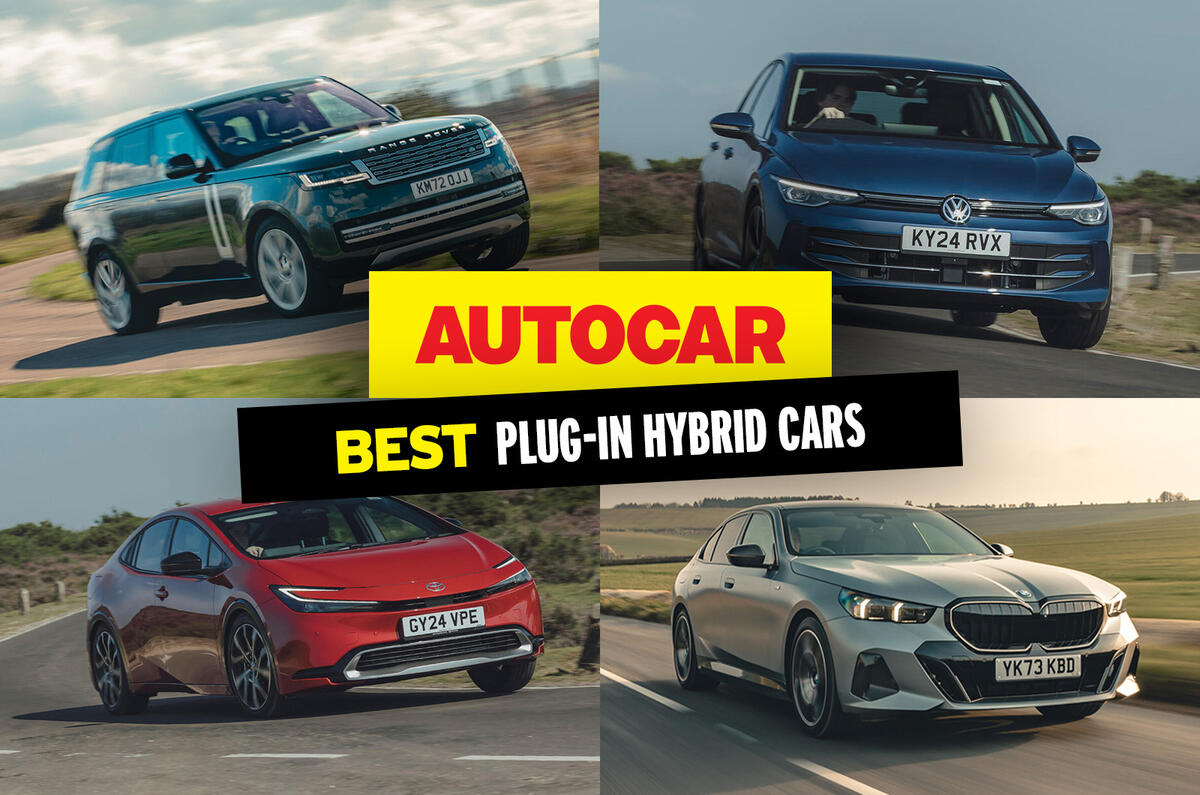Best plug-in hybrid cars: driven and ranked
Plug-in hybrid cars offer a blend of range and economy – here are the best on sale today

News
by Jack Warrick
7 mins read
29 November 2024
Share
If you’re not ready to move to a fully electric battery-powered car, plug-in hybrid cars are one of the best ways to dip your toe into the world of electrification.
They split the best of both worlds, powered primarily by an internal combustion engine but supported by a sizable battery and an electric motor.
Plug-in hybrid cars can drive solely on electric power for extended periods, unlike regular hybrids or mild hybrids.
Related articles
- The best large SUVs – driven, rated and ranked
- The best small SUVs – driven, tested and ranked
- The best sports cars – driven, rated and ranked
- The best MPVs and people carriers – driven and tested
- Best hot hatches – driven, rated and ranked
While their electric ranges were previously quite short, they’re now growing to impressive levels.
Some can even drive over 60 miles on electric only, which means many drivers might never need to fuel their car with petrol if they keep their cars charged.
Plug-in hybrid cars come in all shapes and sizes. SUVs, saloons, estates and even hatchbacks are now available as plug-in hybrids, so there’s no shortage of choice.
But which are the best you can buy today? We’ve dived into a handful of segments and listed the best so you don’t have to.
Our top pick is the Volkswagen Golf eHybrid, which offers a sublime electric range and excellent comfort for a good price. Read on to see the rest of the list…
1. Volkswagen Golf eHybrid
9
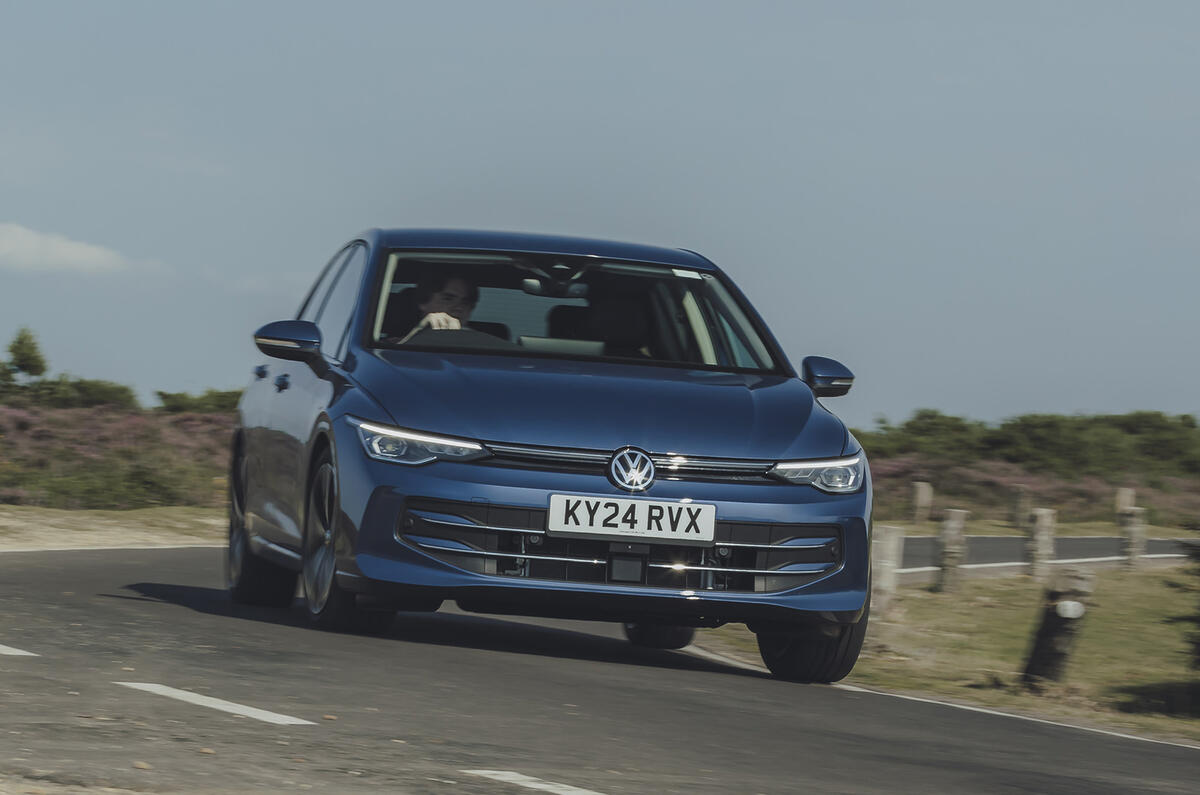
- Design10
- Interior8
- Performance8
- Ride & Handling9
- Costs10
Pros
Outstanding electric range
Pleasant, understated, comfort-first dynamic character
Blends compactness with usable space really expertly
Cons
Costs 20 per cent more than regular ICE options
Compromises under-floor boot space
Little particular charm or sporting ambition
Best for: Electric range
Good things come in small packages, and that’s certainly the case with the new Volkswagen Golf eHybrid.
A 2024 update fixed many of the usability issues reported by drivers including the interior, bringing back steering wheel buttons and implementing a much-improved infotainment system.
Outside of the sportier Golf GTI and R variants, the eHybrid is the peak of the model range. Its 19.7kWh battery offers a staggering 88 miles of range, which is one of the highest figures on the market. Our own tests showed that around 70 miles is achievable in the real world, which is still mightily impressive.
Because of this, the Golf eHybrid feels like an EV to drive a great deal of the time, but its price tag of just over £37,000 makes it an even more appealing proposition. It’s a great plug-in hybrid that could genuinely change your motoring habits.
Read our Volkswagen Golf eHybrid review
Save money on a new Volkswagen Golf with What Car?
Finance this car with Drivenfi
Latest Reviews

Mercedes-AMG CLE 53
8

Volkswagen Tiguan
7

Honda Civic Type R
9

Used BMW 3 Series Touring 2012-2019 review
9
Used BMW 3 Series Touring 2012-2019 review

Aston Martin Vantage Roadster
Read our review
Car review

BMW 3 Series 330e
Is this crucial plug-in hybrid version of the big-selling saloon a true BMW to its core?
Back to top
2. BMW X5 50e
9
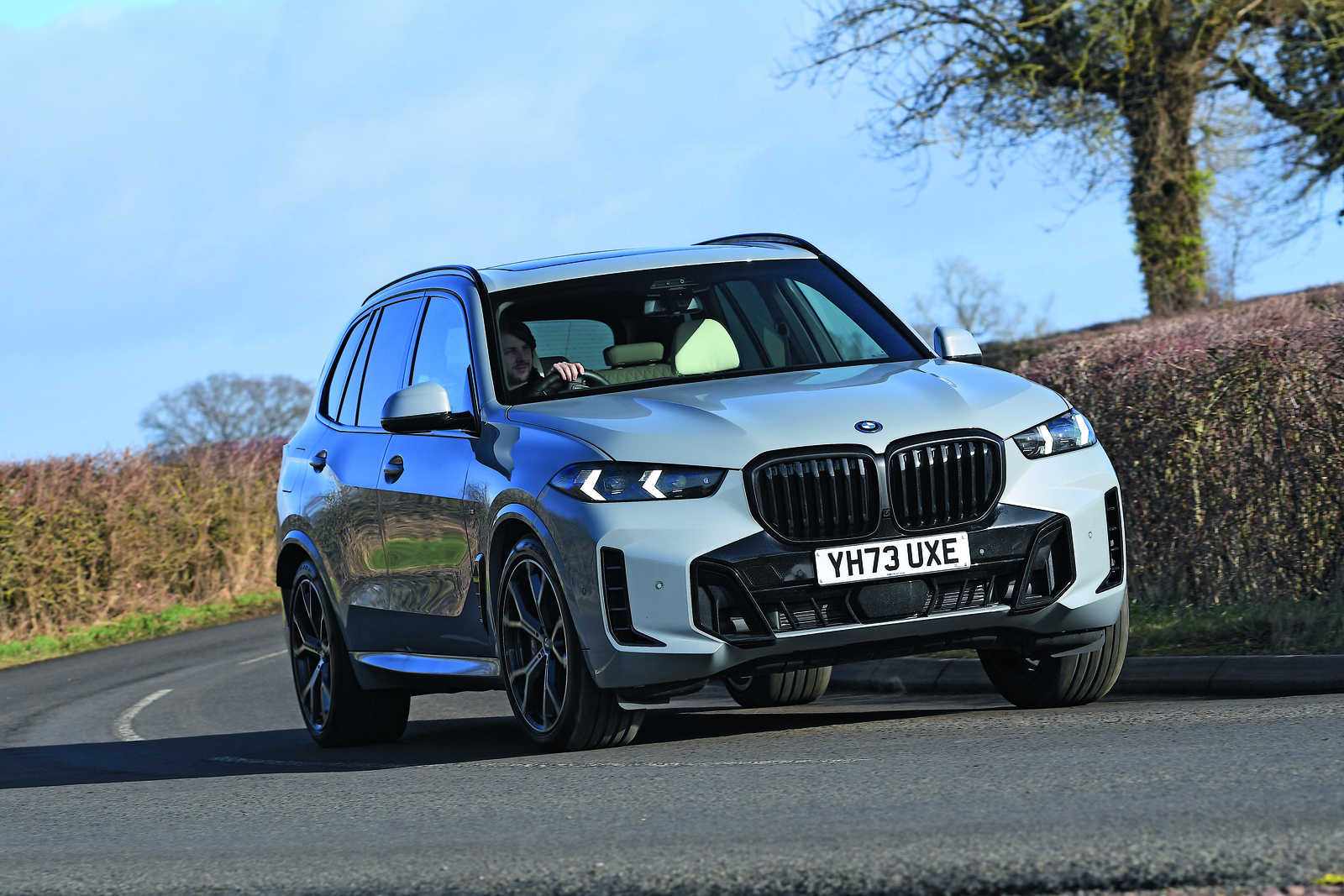
- Design9
- Interior7
- Performance10
- Ride & Handling9
- Costs8
Pros
Serious performance
64 miles of electric range
Refined and dynamic handling
Cons
Drop in interior quality
Hybrid can charge at 7.4kW only
Some rival SUVs are more practical
Best for: Families
BMW’s family SUV is a great option for drivers who want a plug-in hybrid car with great driving dynamics and performance.
The X5 combines a 3.0-litre straight-six petrol engine with a 194bhp electric motor and a 25.7kWh battery. The electric range stands at around 58 miles, which is competitive for the segment.
In total, it pumps out 483bhp and 516lb ft of torque which helps thrust the X5 from 0-62mph in just 4.8sec.
Best of all, BMW has injected the X5 with a dose of dynamic ability which sets it apart from its rivals. Tight body control and excellent ride comfort make it one of the best for drivers and passengers alike. It’s a PHEV that should come close to topping your shortlist.
Read our BMW X5 50e review
Save money on a BMW X5 with What Car?
Finance this car with Drivenfi
3. Range Rover P460e
9
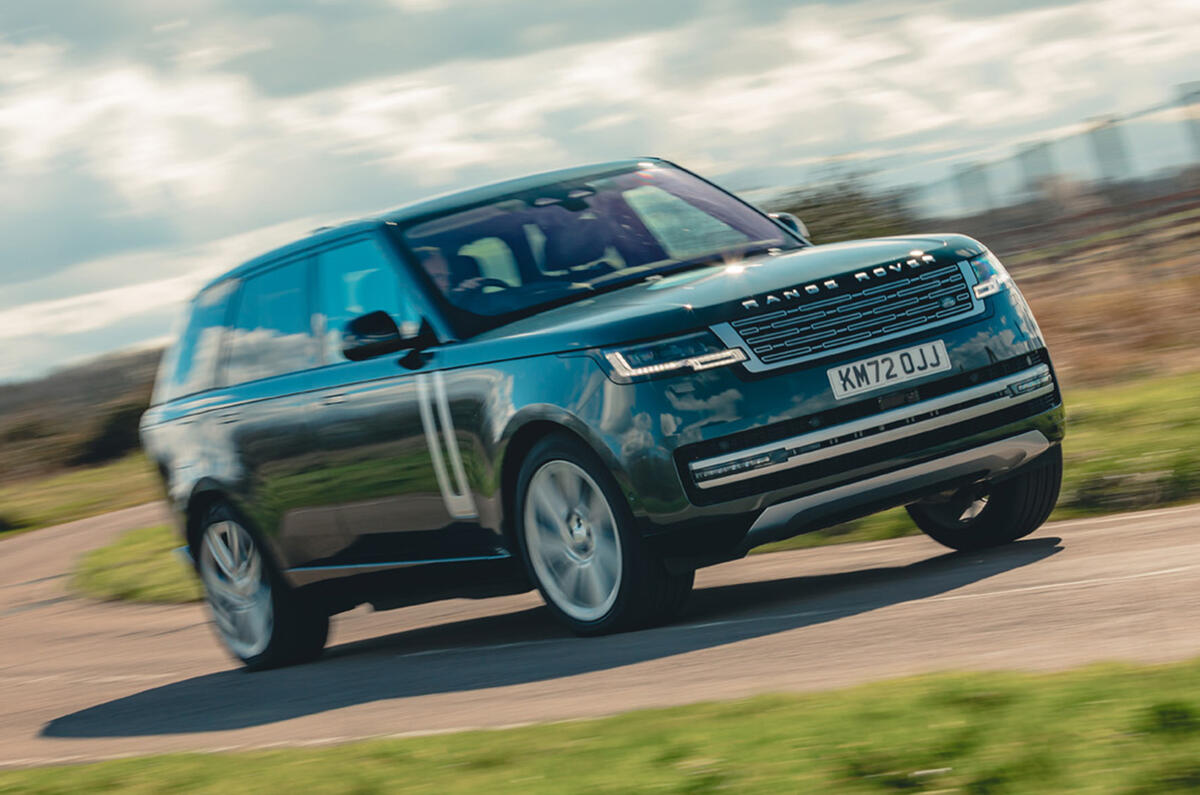
- Design8
- Interior9
- Performance10
- Ride & Handling10
- Costs5
Pros
Exceptional refinement
Brilliant off road
Well-finished cabin
Cons
Expensive
Questionable looks
Very, very heavy
Best for: Luxury
The Range Rover is a brilliant all-round performer, but the plug-in hybrid version has some boons of its own that make it one of the best on the market.
Named the Range Rover P460e, this large, electrified SUV is driven by a 3.0-litre, six-cylinder engine with a total of 453bhp available. Then there’s the more powerful 550e, which produces 542bhp.
Both share the same whopping 38.2kWh battery and are capable of between 68 and 75 miles of range on a charge. We think the plug-in Range Rover is one of the best around, gaining a weighty EV range in addition to its already sublime comfort levels and excellent outright performance.
It is mightily expensive, though. A new, basic Range Rover P460e will set you back at least £115,000, which many drivers will likely feel could be spent better elsewhere.
Read our Range Rover P460e review
Save money on a new Range Rover with What Car?
Finance this car with Drivenfi
Back to top
4. BMW 3 Series 330e
9
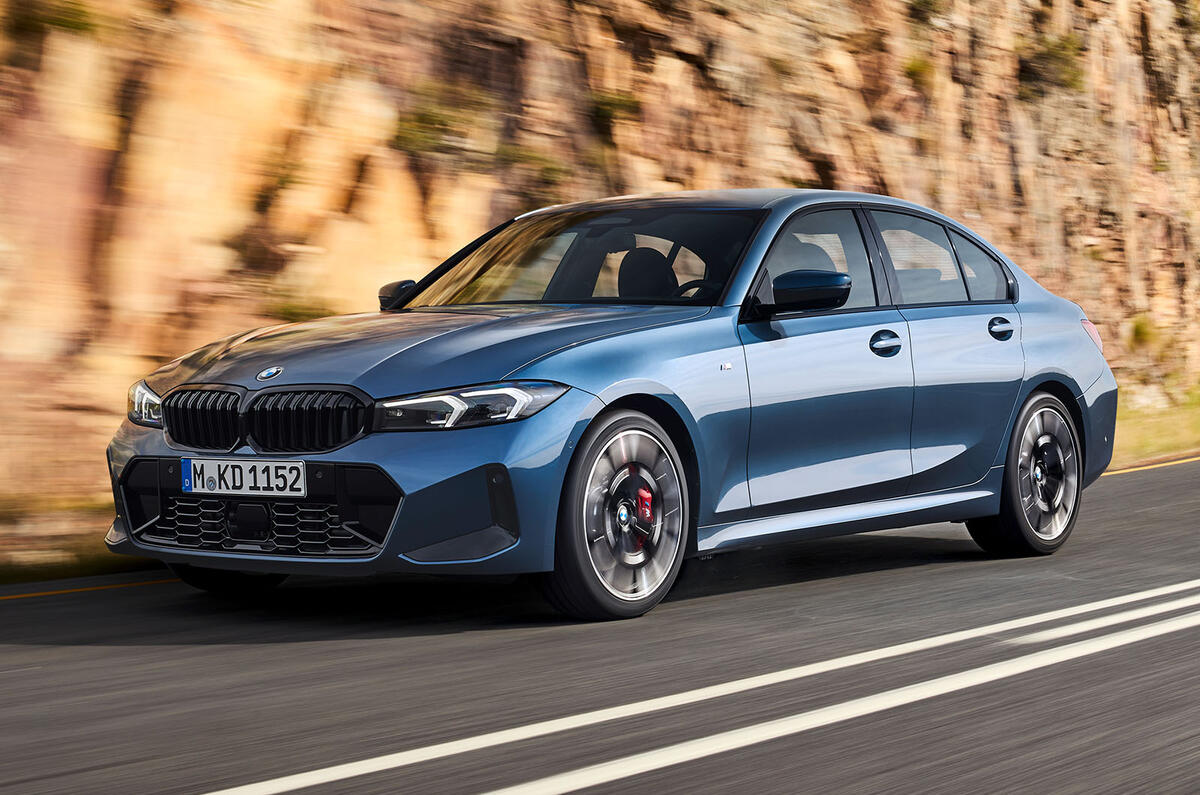
- Design8
- Interior8
- Performance9
- Ride & Handling9
- Costs8
Pros
Still handles like a sports saloon
EV range due to increase to 62 miles
A go-to pick for company car drivers
Cons
Fidgety ride
Slightly reduced boot space
Multi-modal complexity of driving experience
Best for: Handling
It’s not uncommon to have concerns about how different a plug-in hybrid variant of a car is to drive compared to its pure-combustion counterpart.
There are no such worries to be had with the BMW 3 Series 330e though, which we think is pretty much as good to drive as the regular car.
It’s similarly incisive in the corners with a vibrant handling balance, good body control and decent refinement. Even with a heavier, electrified powertrain, it’s still every bit a sports saloon – and that’s important.
It’ll get a bigger battery in 2025, upgraded from 10.3kWh to 19.5kWh, which will boost range from around 37 miles to 62 miles. We’re hopeful it won’t affect how it drives too negatively.
Read our BMW 3 Series 330e review
Save money on a new BMW 3 Series with What Car?
Finance this car with Drivenfi
5. Skoda Kodiaq iV
8
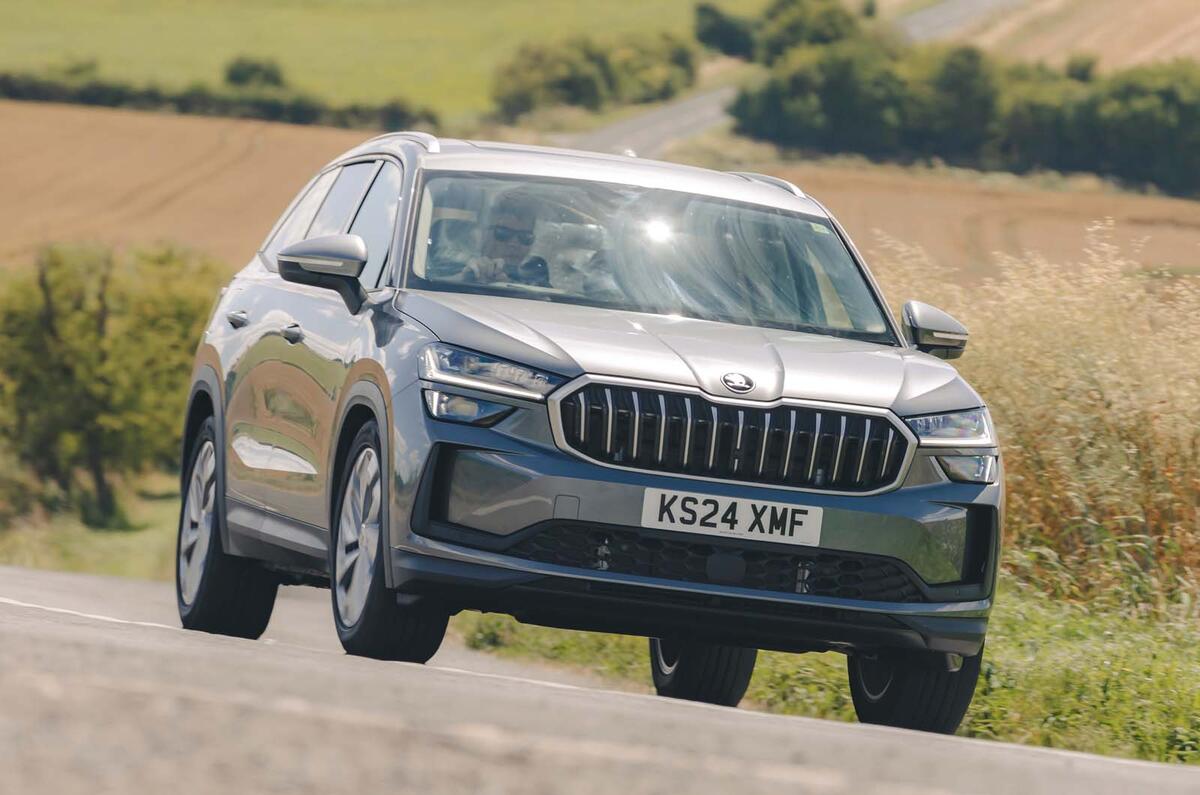
- Design7
- Interior8
- Performance8
- Ride & Handling8
- Costs8
Pros
Very roomy and practical
Unrivalled PHEV range for SUVs
Great interior layout
Cons
Doesn’t ride as well as it should
Indecisive DSG automatic gearbox
Too many modes in PHEV version
Best for: Practicality
The Skoda Kodiaq is the longest-legged plug-in hybrid SUV on this list, with 71 miles offered from its huge 25.7kWh battery.
That’s vastly better than similarly-sized rivals, including the Kia Sorrento and the Volkswagen Multivan e-Hybrid, which offer 34 and 30 miles respectively.
Skoda’s SUV isn’t just a good plug-in hybrid: it’s a capable all-round performer. It produces 201bhp in total and will hit 0-62mph in 8.4 sec.
However, it does lose some degree of practicality due to its powertrain. The boot, while still an impressive, practical size, drops from 910 litres to 745 litres due to the battery’s positioning. It’s also not quite as versatile as the standard Kodiaq, as it can’t be selected with seven seats.
Read our Skoda Kodiaq iV review
Save money on a new Skoda Kodiaq with What Car?
Finance this car with Drivenfi
Back to top
6. Toyota Prius
8
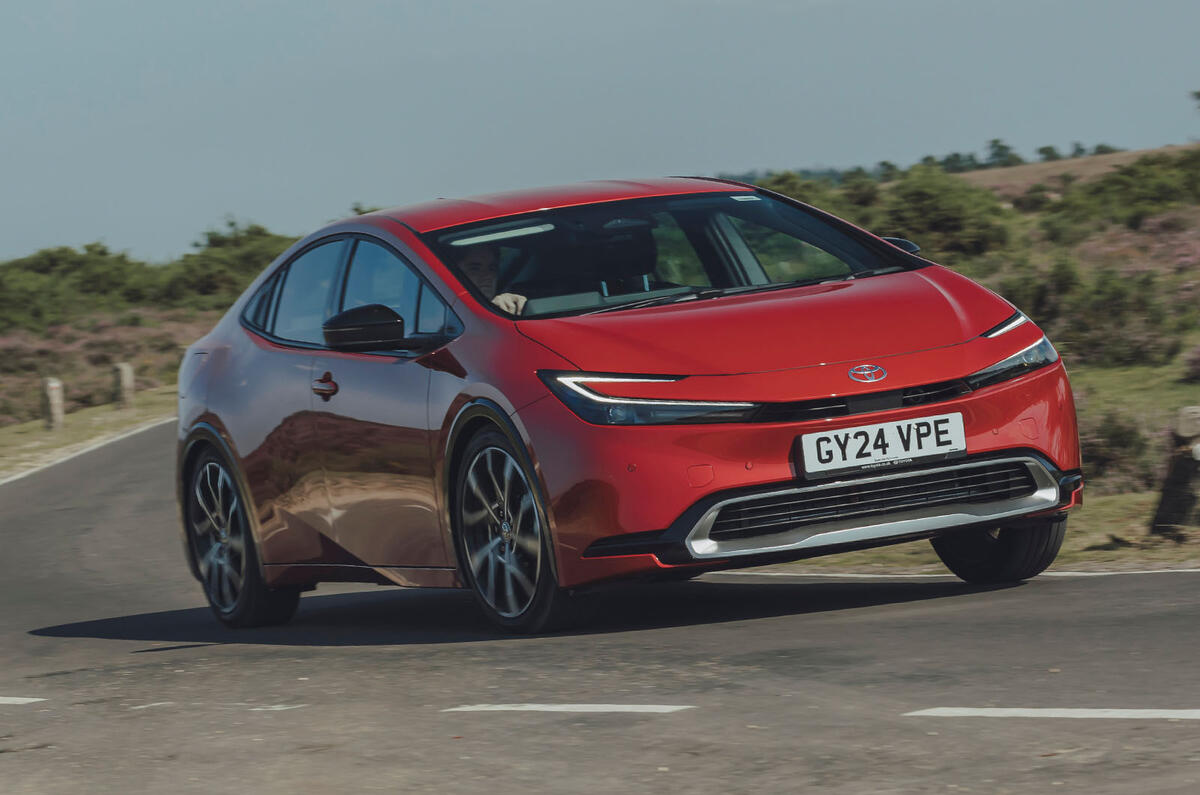
- Design8
- Interior8
- Performance8
- Ride & Handling8
- Costs8
Pros
Sleek looks
Good efficiency
It’s finally come to the UK
Cons
Higher-spec model breaches £40k luxury car tax limit as soon as you add an option
Slightly drab interior materials
Not the most precise steering
Best for: Looks
We’re lucky to even be looking at the new Toyota Prius on UK plates, considering it was supposedly never intended to be sold here in the first place.
Sporting a fresh, modernised design, the new Prius is also significantly different under the metal. It’s now available as a plug-in hybrid (the regular full-hybrid is no longer available here) with a 13.6kWh battery, which can return 53 miles of electric range.
The Prius uses a 2.0-litre, 150bhp engine mated to a 161bhp electric motor. Total output stands at 220bhp – a big improvement over the previous Prius, which only produced 121bhp. It’s enough for a 0-62mph time of 6.8sec.
Toyota is one of the pioneers of hybrid technology, and that much is clear with the Prius. After all this time, it still has one of the best hybrid systems available today, but it also drives more dynamically than before, with good levels of comfort to boot.
Read our Toyota Prius review
Save money on a new Toyota Prius with What Car?
Finance this car with Drivenfi
7. BMW 5 Series 550e
8
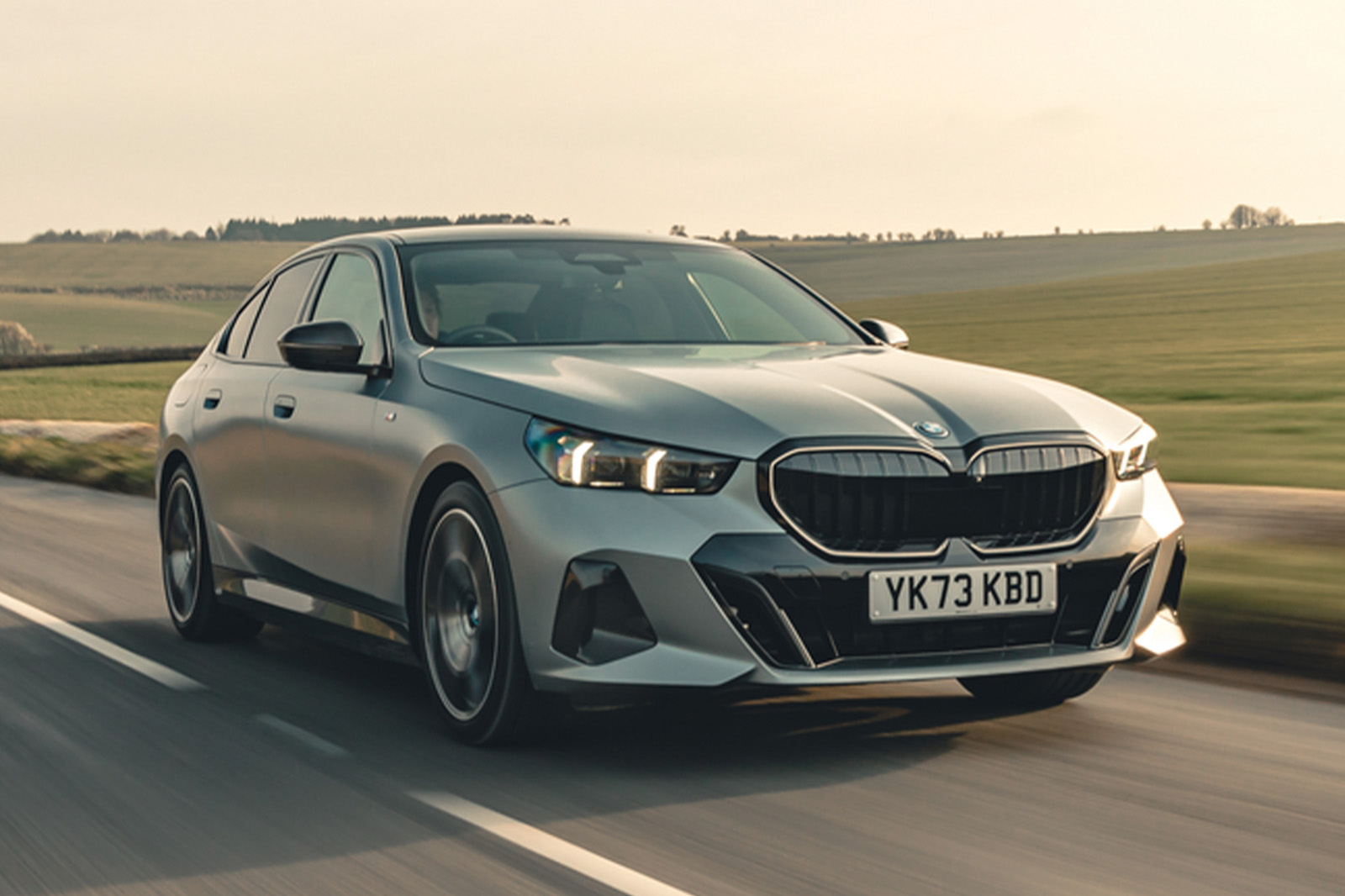
- Design8
- Interior8
- Performance9
- Ride & Handling9
- Costs7
Pros
Six-cylinder PHEV powertrain is sonorous and capable
Superb road manners
i7-esque isolation in EV mode
Cons
Tech-heavy cabin
Personality drifts into 7 Series territory
Electric range can suffer dramatically on slower routes
Best for: All-round ability
Another BMW?! Well, yes. The BMW 5 Series is also a brilliant plug-in hybrid SUV and one of the best all-rounders on our list.
Its on-paper stats are impressive. It takes the brand’s 308bhp six-cylinder B58 petrol engine and partners it with a 194bhp electric motor. Total power is 483bhp and it’ll take just 4.4sec from 0-62mph.
That’s quick, but it’s nothing compared to its incredible thrust in sport mode. It’ll take just 1.9sec from 20-40mph, which is quicker than 2021’s BMW M5 CS.
All that, and it’ll do 56 miles of electric-only driving, and can be selected in saloon and estate body styles. It’s a seriously versatile package and should not be ignored by fleet and company car customers.
Read our BMW 5 Series 550e review
Save money on a new BMW 5 Series with What Car?
Finance this car with Drivenfi
Back to top
8. Mercedes E-Class
8
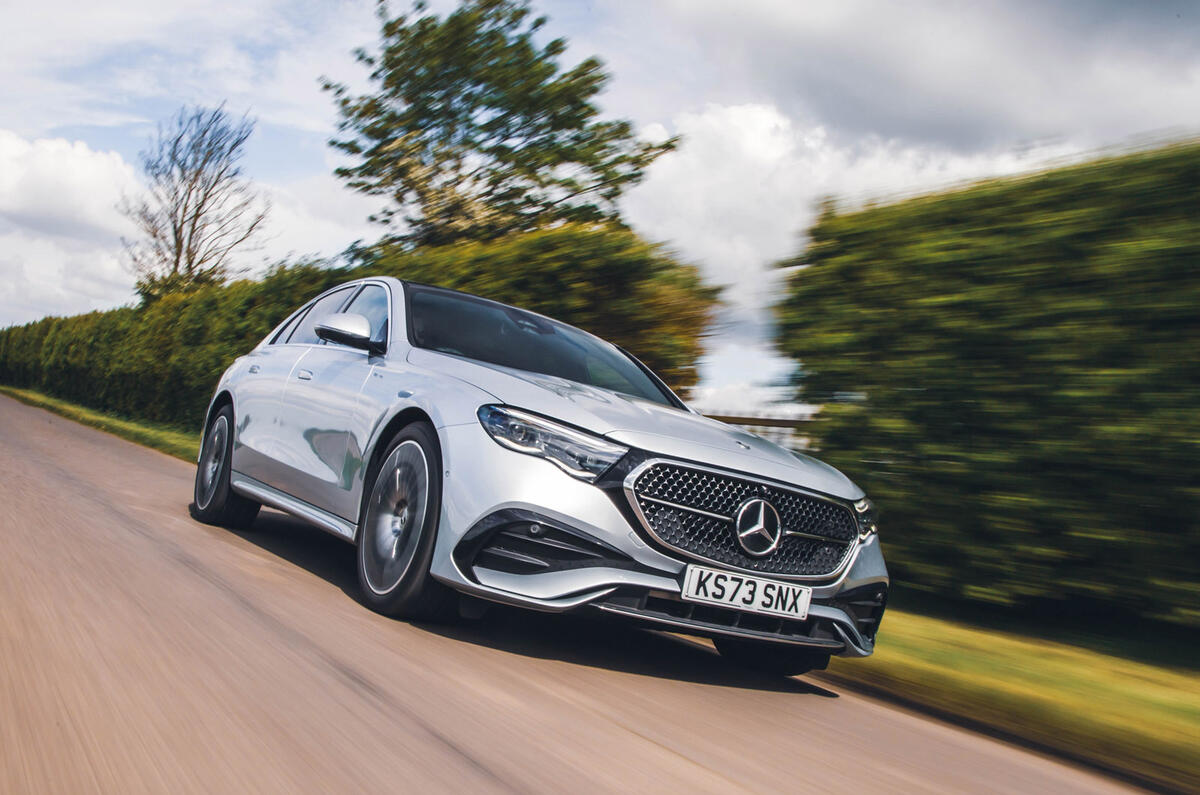
- Design8
- Interior8
- Performance8
- Ride & Handling8
- Costs8
Pros
68 miles of EV rangePo
Great interior quality
Clever adaptive cruise control system
Cons
Ride quality doesn’t match the class standard
Expensive
Some odd user interface changes
Best for: Comfort
As our ratings might suggest, the Mercedes E-Class is a brilliant all-rounder and a must-consider option for company car drivers looking to take advantage of benefit-in-kind rates.
The plug-in hybrid E300e gets a huge 25.4kWh battery with 68 miles of range, which is near the top of the pack.
It gets 308bhp and a 0-62mph time of 6.4sec which is impressive, but what stands out is its effortless transition from electric to petrol power.
The E330e feels pretty swift when travelling on electric and can sit at motorway speeds comfortably. Partner that with great comfort levels and there are few better long-distance companions out there.
Like some of the other cars here though, it has its practical downsides. The boot in plug-in hybrid variants loses 170 litres of boot space, down to 370 litres. Not great.
Read our Mercedes E-Class review
Save money on a new Mercedes E-Class with What Car?
Finance this car with Drivenfi
9. Lexus NX450+
8
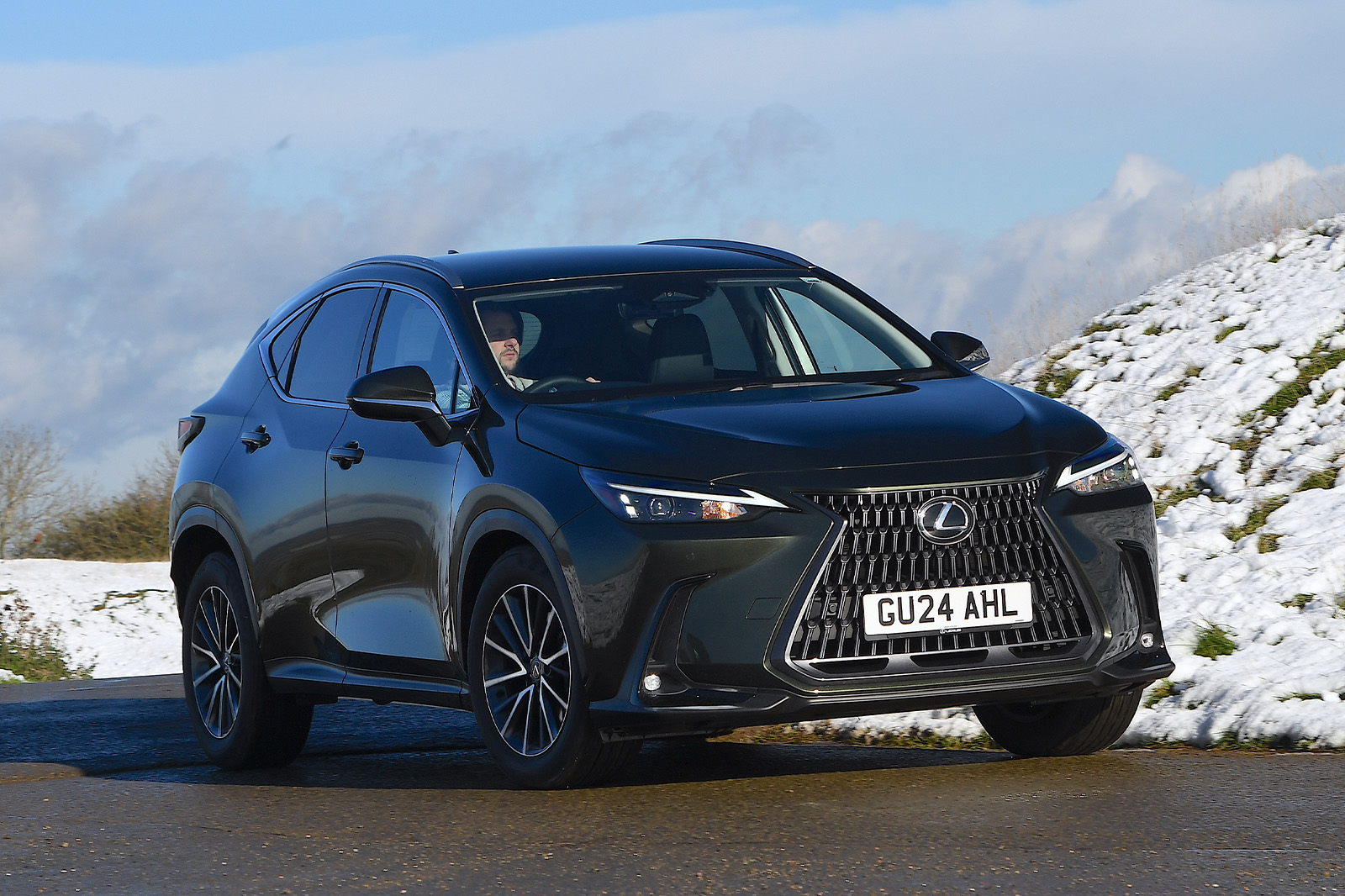
- Design8
- Interior8
- Performance7
- Ride & Handling7
- Costs7
Pros
Much-improved infotainment
Tidy handling and steering
Smart styling
Cons
Ride quality isn’t always up to snuff
Engine drones loudly at idle with an empty battery
Unexceptional cabin isolation
Best for: Reliability
As a sister brand to hybrid masters Toyota, Lexus was always going to have class-leading technology at its disposal.
The Lexus NX is the brand’s mid-sized SUV and its plug-in hybrid powertrain is one of the best out there.
Available in front and four-wheel drive, the Lexus NX combines a 2.5-litre petrol engine with a 53bhp electric motor for a total of 300bhp. The lesser-powered NX 350h is also a good option, producing 241bhp.
The electric range is middling today at around 45 miles, but it’s still enough for most drivers commuting to work.
The NX’s trump card is its posh-feeling interior, which is packed with technology and high-grade materials. It’s a very pleasant place to sit.
While the NX might be somewhat of a left-field choice, it’s still a solid option and you can be sure the entire family will be comfortable in most scenarios.
Read our Lexus NX450+ review
Save money on a new Lexus NX with What Car?
Finance this car with Drivenfi
Back to top
10. Volkswagen Multivan eHybrid
7
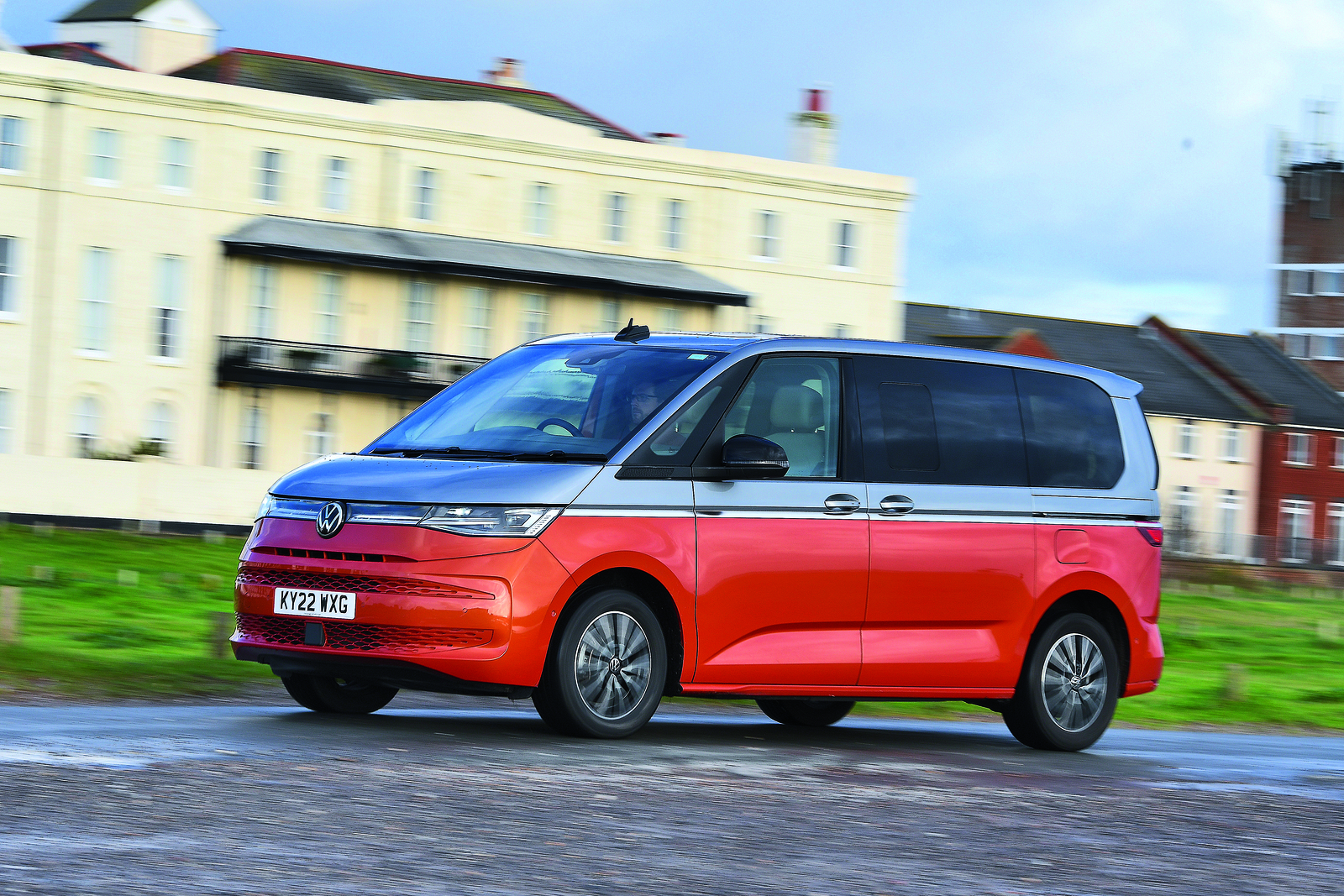
- Design8
- Interior8
- Performance7
- Ride & Handling8
- Costs7
Pros
Incredible space
Looks good inside and out
Manoeuvrable considering its size.
Cons
Poor infotainment
Defaults to EV mode on each start
Some rattles here and there
Best for: Practicality
The Volkswagen Multivan is by far the most spacious option on this list of plug-in hybrid cars.
Seven-seater variants offer 469 litres with the seats in place, but this jumps up to a cavernous 1844 litres with the third row flat. All seats down and you’ve got a staggering 3672 litres of cargo space.
The Multivan eHybrid gets a 13kWh battery, and its range isn’t as good as many of its rivals, with just 29 miles of range on offer.
It’s still a usable amount though, and its powertrain, consisting of a 148bhp 1.4-litre petrol engine and a 114bhp electric motor, is a refined combination.



